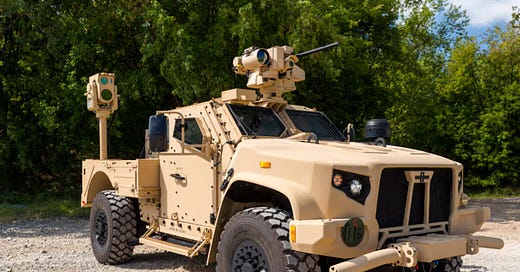The Marine Corps Sheathes Its CLaWS
The Marine Corps’ Compact Laser Weapons System (CLaWS) is no more, a service spokesperson confirmed to Laser Wars.
The Marine Corps has pulled the plug on a laser weapon system the service had previously billed as “the first ground-based laser approved by the Department of Defense for use by warfighters on the ground,” Laser Wars has learned.
First unveiled in 2019, the Compact Laser Weapons System (CLaWS) consisted of a Boeing-made high-energy laser array that can be mounted on tactical vehicles like the Polaris MRZR or deployed at static locations as a low-cost alternative to “traditional firepower” for swatting incoming enemy drones out of the sky, as the Marine Corps put it in a release at the time.
“We’re providing CLaWS to Marines as a rapid prototype for evaluation,” Don Kelley, program manager for Ground Based Air Defense at Program Executive Officer Land Systems, said in the release. “Depending on the results, CLaWS could become part of a larger capability set.”
Despite the fanfare surrounding the CLaWS – the Corps bragged that its adoption put the service “at the forefront of ground-based lasers” – little information was publicly released about the testing and evaluation of the system. A January 2021 video shows Marines deployed to the US Central Command area of operations testing the CLaWS against small drones; later that year, the service awarded a $2.5 million contract to Boeing to maintain its five systems over the next year with four possible subsequent one-year extensions.
As of January 2025, those five CLaWS systems had since been returned to Boeing, Marine Corps Systems Command spokesperson Morgan Blackstock told Laser Wars in an email.
“We do not currently plan on purchasing any additional CLaWS in the configuration that we procured in 2018,” Blackstock said.
When asked why the service had returned the systems to Boeing, Blackstock stated that CLaWS “was an urgent capability, not a program of record. The Marine Corps decided to invest in more deliberate programs of record.”
It’s unclear which “deliberate” laser weapon initiatives Blackstock was referring to. The Navy’s fiscal year 2025 budget request and a July 2024 update from the Congressional Research Service on Pentagon directed energy programs did not indicate any active Marine Corps ground-based laser initiatives outside of broad research and development.
It’s worth noting that the Pentagon did award a contract to defense upstart BlueHalo in November 2023 to explore the integration of the company’s LOCUST Laser Weapon System, which the Army successfully employed to shoot down hostile drones overseas sometime in the last several years, onto the Joint Light Tactical Vehicle that’s set to partially replace the service’s Humvee fleet.




